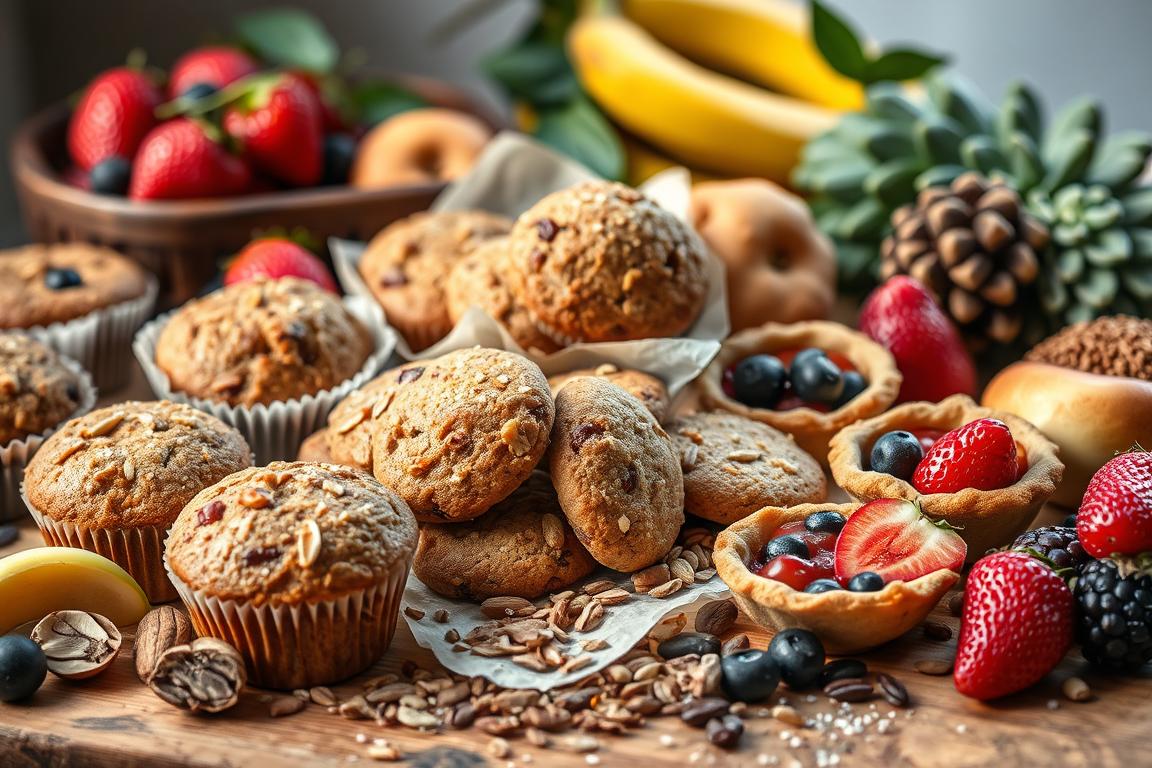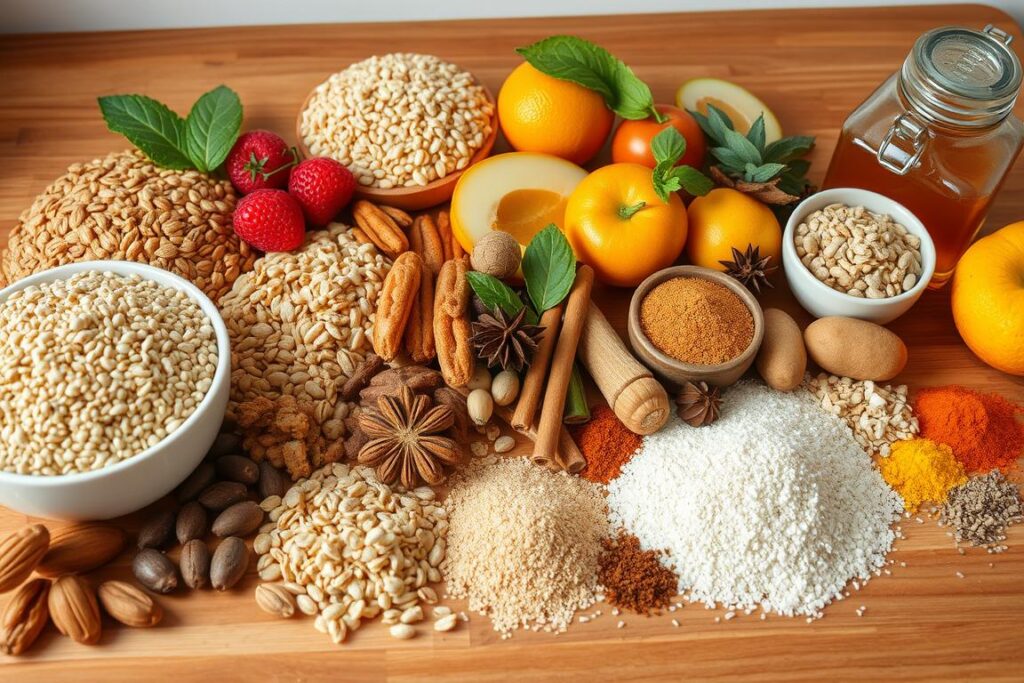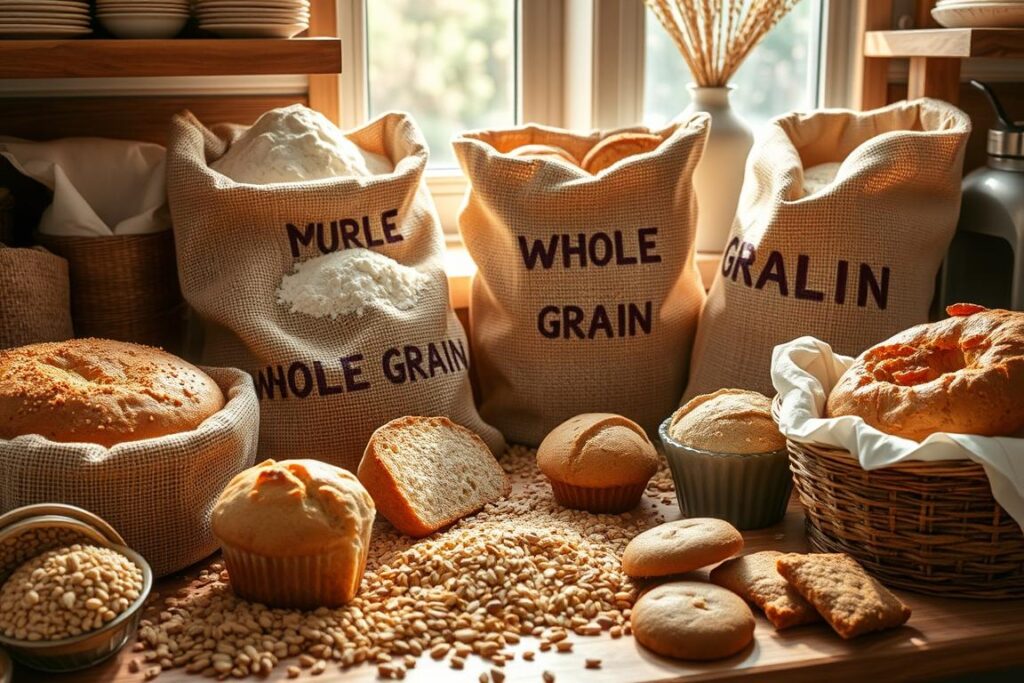
Imagine biting into a delicious dessert that’s good for you. Healthy baking recipes have changed how we see treats. Now, we know that tasty sweets can also be healthy. No more boring healthy food – today’s recipes are exciting, with over 20 options that taste amazing.
Starting your healthy baking journey is easy. Most recipes need only 3 to 5 simple ingredients. You can make incredible treats like gluten-free chocolate peanut butter bars or no-bake chocolate fudge oat bars. These recipes show how clean ingredients can make traditional desserts healthier.
If you want to eat less refined sugar or try healthier sweets, you’re in the right place. This collection of recipes has something for everyone. We’ll show you how to bake healthier without losing flavor. You’ll learn to make treats that are both delicious and support your health goals.
Key Takeaways
- Discover over 20 healthy dessert recipes with simple ingredients
- Learn techniques for reducing refined sugars in baking
- Explore gluten-free and dietary-friendly baking options
- Create delicious treats that support nutritional goals
- Master quick and easy healthy baking techniques
Understanding the Basics of Healthy Baking
Healthy baking turns old recipes into tasty, good-for-you treats. It uses clean ingredients and smart ways to cook. This way, you can make baking healthier and more enjoyable.

Clean Ingredients vs Traditional Baking Components
Choosing clean ingredients means picking whole, less processed foods. These foods are healthier than traditional baking ingredients. Here’s why:
- Whole wheat flour instead of refined white flour
- Natural sweeteners like honey or maple syrup
- Unrefined sugars with lower glycemic index
- Healthy fats such as coconut or avocado oil
“Baking healthy is not about deprivation, but about making smarter ingredient choices” – Nutrition Expert
Essential Tools for Healthy Baking
Having the right tools makes healthy baking fun and easy. Here are some must-haves:
- High-quality measuring cups
- Silicone baking mats
- Digital kitchen scale
- Versatile mixing bowls
Common Substitutions for Healthier Results
| Traditional Ingredient | Healthy Substitute | Benefit |
|---|---|---|
| White Sugar | Stevia | Zero calories, zero glycemic index |
| Butter | Greek Yogurt | Reduces saturated fat |
| Eggs | Ground Flaxseed | Vegan-friendly, adds fiber |
Learning these basics of healthy baking helps you make clean ingredients-based treats. These treats are not only tasty but also good for you. Remember, small changes can make a big difference in your baking.
Benefits of Using Whole Grain Flours in Baking

Explore the world of whole-grain delights and change your baking with nutritious flours. These flours add flavor and health benefits. They make your baked goods more nutritious and satisfying.
Whole-grain flours are packed with nutrients. They keep all parts of the grain, like the bran, germ, and endosperm. This means you get a full nutritional package in every bite.
“Whole grains are nature’s nutritional powerhouses, delivering fiber, vitamins, and minerals in every delicious serving.”
For more ideas on how to bake with natural ingredients, check out how oatmeal cookies can be healthy.
Nutritional Advantages of Whole Grain Flours
- Higher fiber content supporting digestive health
- Increased vitamin and mineral levels
- Improved satiety and possible weight management
- Better blood sugar regulation
When exploring whole-grain delights, consider these popular flour varieties:
| Flour Type | Key Nutritional Benefit | Best Used In |
|---|---|---|
| White Whole Wheat Flour | Mild flavor, high fiber | Muffins, pancakes |
| Oat Flour | Gluten-free, high protein | Cookies, quick breads |
| Spelt Flour | Ancient grain, easier digestion | Artisan breads |
Pro tip: Start by replacing 50% of all-purpose flour with whole grain alternatives to maintain familiar textures while boosting nutrition.
Your baking journey with whole-grain delights is easy. By making simple substitutions and understanding each flour’s unique characteristics, you can create healthier, more flavorful baked treats that everyone will love.
Natural Sweeteners: Alternatives to Refined Sugar
Exploring sugar-free desserts is now easier than ever! Natural sweeteners offer tasty alternatives for baking. They help make treats that are both delicious and healthy.
Fruit-Based Natural Sweeteners
Fruit-based sweeteners are great for sugar-free desserts. Here are some top picks:
- Mashed bananas: Adds moisture and natural sweetness
- Date paste: Offers a concentrated natural sweetener
- Applesauce: Reduces calories while adding natural sweetness
“Nature provides the best sweeteners without compromising flavor.” – Nutrition Experts
Zero-Calorie Sweetening Techniques
Sugar-free desserts can use zero-calorie sweeteners. These don’t raise blood sugar levels. Stevia and erythritol are excellent choices:
- Stevia: Zero calories, zero glycemic index
- Erythritol: Zero calories, doesn’t affect blood sugar
Natural Liquid Sweeteners
Some liquid sweeteners have unique benefits for sugar-free desserts:
- Honey: Contains antioxidants
- Maple syrup: Lower glycemic impact
- Agave nectar: 1.5 times sweeter than sugar
Pro tip: When substituting sweeteners, adjust liquid ingredients to maintain recipe consistency.
Double Chocolate Banana Muffins: A Wholesome Breakfast Option
Looking for a tasty and healthy breakfast? Double Chocolate Banana Muffins are the answer. They’re made with good ingredients and turn bananas into a tasty morning treat. They’re perfect for those who love chocolate.
Here’s why these muffins are so great:
- 12 muffins per batch
- Only 35 minutes total preparation time
- Approximately 159 calories per serving
- Rich in protein with 4g per muffin
These muffins are moist and fluffy thanks to simple, quality ingredients. Ripe bananas add natural sweetness. Whole wheat flour makes them nutritious. The double chocolate flavor comes from cocoa powder and chocolate chips, making them feel like a special treat.
“Healthy eating doesn’t mean sacrificing flavor – it means being smart about ingredients!” – Nutrition Expert
Here are some tips for baking perfect muffins:
- Use very ripe, spotty bananas for maximum sweetness
- Don’t overmix the batter to keep muffins tender
- Fill muffin liners ¾ full for ideal rising
- Bake at 425°F for 5 minutes, then reduce to 350°F
Storing these muffins is easy. Store them in an airtight container at room temperature for up to 3 days. Refrigerate for a week. Freeze for up to 3 months for longer storage.
Healthy Baking Recipes for Beginners
Starting with healthy baking might seem scary, but it’s really fun. It turns good-for-you treats into tasty delights. This guide will make your journey easier and boost your confidence.
To begin with healthy baking, you need to know a few basic rules. These rules make baking healthy foods easy and fun. Let’s look at some easy ways to get good at baking healthy treats.
Simple One-Bowl Recipes
One-bowl recipes are great for beginners who want to bake healthily with less mess. These recipes help you:
- Keep your kitchen clean
- Save time
- Make mixing easier
- Feel more confident in baking
Quick No-Bake Options
No-bake recipes are perfect for quick, guilt-free treats. They offer:
- Fast results
- Healthy ingredients
- No baking skills needed
- Cool, refreshing snacks
Fool-Proof Healthy Cookies
Cookies are a great place to start for new bakers. With the right ingredients and methods, you can make tasty, healthy cookies that everyone will enjoy.
“Healthy baking isn’t about deprivation—it’s about creating delicious alternatives that nourish your body and soul.” – Nutrition Expert
Remember, getting better at healthy baking takes practice. Start simple, try new ingredients, and enjoy making healthy, delicious treats that help you stay well.
Plant-Based Ingredients for Vegan Baked Goods
Vegan baked goods open a world of creativity. They turn traditional recipes into tasty dairy-free treats. The secret is using plant-based ingredients instead of animal products.
Essential Egg Replacements
Finding good egg substitutes is key for vegan baking. Here are some top picks:
- Flaxseed: 1 tablespoon with 3 tablespoons water
- Mashed banana: 2-3 tablespoons
- Aquafaba: 3 tablespoons
- Cornstarch: 2 tablespoons mixed with 2 tablespoons water
Milk and Fat Alternatives
Smart swaps are needed for plant-based baking. Try these:
| Traditional Ingredient | Vegan Replacement | Ratio |
|---|---|---|
| Oil | Applesauce | 1/3 cup applesauce replaces 1/2 cup oil |
| Margarine | Nut butters | 1:1 replacement |
| Buttermilk | Plant milk + vinegar | 1 cup plant milk + 2 tbsp acidic liquid |
Your vegan baked goods can be just as tasty as the originals. Experimenting is the way to find the right mix of plant-based ingredients. With these swaps, you’ll make treats that everyone will love.
Pro tip: Let your plant-based milk and vinegar mixture stand for 5-10 minutes to create a perfect buttermilk alternative.
Plant-based baking is more than a trend. It’s a way to make desserts that are inclusive and healthy. And they don’t lose out on taste or texture.
Gluten-Free Baking: Tips and Techniques
Making tasty gluten-free treats needs skill and knowledge. As more folks follow gluten-free diets, learning to bake gluten-free is key for both home cooks and chefs.
Creating Perfect Gluten-Free Flour Blends
Great gluten-free baking begins with the right flour mix. Each gluten-free flour has its own special qualities that can change your baked goods:
- Rice flour: Light and neutral flavor
- Almond flour: Adds moisture and richness
- Oat flour: Provides softness and texture
- Buckwheat flour: Offers nutty undertones
Understanding Binding Agents
Xanthan gum is vital in gluten-free baking. It acts like gluten, helping your gluten-free treats keep their shape and texture. Use 1/4 to 1 teaspoon per cup of gluten-free flour.
“The secret to great gluten-free baking is understanding how alternative ingredients work together.”
Pro Tips for Gluten-Free Success
Boost your gluten-free treats with these expert tips:
- Use a kitchen scale for precise measurements
- Mix batters thoroughly to develop structure
- Add extra moisture through fruits or vegetables
- Allow for longer baking times
With practice and patience, you’ll make gluten-free treats as tasty as regular ones. Gluten-free baking is an art that rewards creativity and careful technique.
Nutritious Monster Cookies with Simple Ingredients
Looking for a treat that’s both tasty and healthy? These monster cookies are perfect. They’re made with wholesome ingredients and are loved by families everywhere.
The secret to these cookies is their simple yet effective ingredients. Making a delicious and nutritious treat is incredibly easy.
Ingredient Breakdown
- 1/2 cup natural peanut butter
- 1/3 cup pure maple syrup
- 3/4 cup rolled oats
- 3/4 cup almond flour
- Chocolate chips (optional)
Nutritional Profile
| Nutrient | Amount per Cookie |
|---|---|
| Calories | 125 kcal |
| Protein | 3-4 g |
| Total Fat | 8-9 g |
| Carbohydrates | 10-15 g |
Making these monster cookies is easy! Just preheat your oven to 350ºF. Mix all ingredients in one bowl. Then, scoop onto a baking sheet and bake for 10-12 minutes until they’re golden brown.
“Healthy doesn’t mean boring – these monster cookies prove that nutritious can be delicious!” – Baking Enthuasiast
Storage Tips
Keep these healthy treats in an airtight container:
- Room temperature: 4 days
- Refrigerator: Up to 1 week
- Freezer: Up to 3 months
Pro tip: These nutritious sweets are great for breakfast or as a post-workout snack!
Incorporating Superfoods into Your Baked Treats
Turn your baked goods into superfood snacks with easy swaps. Superfoods make your treats healthier and tastier.
“Nutrition doesn’t have to be boring – it can be delectable and exciting!” – Nutrition Expert
Think about these super ingredients for your snacks:
- Chia seeds for omega-3 fatty acids
- Cacao powder for antioxidants
- Matcha for metabolism support
- Goji berries for vitamin enrichment
Adding these ingredients won’t change how your snacks taste or feel. A little goes a long way in making them healthier.
| Superfood | Nutritional Benefit | Recommended Quantity |
|---|---|---|
| Chia Seeds | 5g Omega-3 per ounce | 2-3 tablespoons per recipe |
| Cacao Powder | High antioxidant content | 1/4 cup per batch |
| Matcha | Metabolism booster | 1-2 teaspoons |
Remember, moderation is important when using superfoods in baking. Start small and adjust as needed.
Storage Tips for Healthy Baked Goods
Keeping your healthy baked goods fresh is key. The right storage keeps them tasting great and full of nutrients.
Packaging Strategies for Maximum Freshness
Choosing the right container is important. Each treat needs its own storage method:
- Use airtight containers for soft cookies and muffins
- Wrap breads in plastic wrap or store in bread boxes
- Place delicate pastries between waxed paper layers
Refrigeration and Freezing Guidelines
Smart storage keeps your treats fresh longer:
- Cool baked goods completely before storing
- Freeze unbaked cookie dough for up to 7 days
- Store cookies in freezer bags for 3 months
“The key to maintaining your baked goods’ quality is understanding their unique storage requirements.”
Shelf Life Recommendations
Each treat has its own shelf life. Most cookies and muffins stay fresh for 2-3 days at room temperature. Cream-based desserts need the fridge and should be eaten within a few days.
Homemade treats lack preservatives. So, careful storage is vital to enjoy them at their best.
Conclusion
Your journey into healthy sweets is just starting. It’s a tasty and healthy baking adventure. With 42% of people looking for new food choices, baking healthy treats has become a lifestyle. It lets you enjoy yummy foods without losing out on nutrition.
Using whole grain flours, natural sweeteners, and new ingredients can make your baked goods better. You can make treats that are good for you and taste great. By cutting down on sugar and adding more fiber, your desserts can be healthier.
Healthy baking is all about finding the right balance and being creative. You can make gluten-free, vegan, or low-sugar treats. Each recipe is a chance to make something special that’s good for you and tastes amazing.
Every baking journey is different. Be curious, passionate, and focused on wellness. The kitchen is your place to create something amazing. Every recipe is a chance to make something that nourishes your body and soul.
For more in-depth information, you can explore healthy baking recipes on Wikipedia, which provides a broader overview of techniques and substitutions.
Happy baking! 🍪
